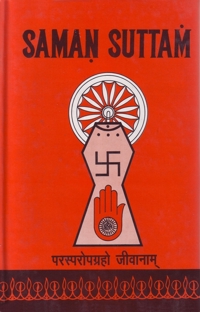25. Vrata Sutra
THE PRECEPTS ON VOWS
Ahimsa saccam ca atenagam ca, tatto ya bambham apariggaham ca.
Padivajjiya pamca mahavvayani, carijja dhammam jinadesiyam viu. (364)A wise monk, after adopting the five great vows of non-voilence, truthfulness, non-stealing, celibacy and non-possessiveness, should practise the religion preached by the Jina. (364)
Nissallasseva puno, mahavvadaim havamti savvam.
Vadamuvahammadi tihim du, nidanmicchattamayahim. (365)A monk, who is free from the thorns of character (salya) really observes (five) great vows; the vows become ineffective due to three thorns of character, i. e., desire for worldly return for one.s good acts, wrong faith and deceit. (365)
Agania jo mukkhasuham, kunai nianam asarasuhaheum.
So kayamanikaenam, veruliyamanim panasei. (366)He, who harbours desire for worthless worldly pleasures and disregard for bliss of emancipation, is like a person who destroys a (real) gem for a (glittering) piece of glass. (366)
Kulajonijivamaggana-thanaisu janiuna jivanam.
Tassarambhaniyattana, parinamo hoi padhamavadam. (367)Mental state of the form of refrainment from killing living beings after having knowledge of them in respect of their species-of-birth, place-of-birth, peculiarities and (marganasthana) this is called the first vow (viz, non-killing). (367)
Savvesimasamanam, hidayam gabbho va savvasatthanam.
Savvesim vadagunanam, pimdo saro ahimsa hu. (368)Ahimsa is the heart of all stages of like, the core of all sacred texts, and the sun (pinda) and substance (sara) of all vows and virtues. (368)
Appanattha parattha va, koha va jai va bhaya.
Himsagam na musam buya, no vi annam vayavae. (369)One should not speak or excite others to speak harmful false words, either in the interest of oneself or of another, through anger or fear. (369)
Game va nayare va, ranne va pecchiuna paramattham.
Jo mumcadi gahanabhavam, tidiyavadam hodi tasseva. (370)He, who desists from a desire to take anything belonging to others, on seeing it lying in a village or town or forest, observes the third vow of non-stealing. (370)
Cittamamtamacittam va, appam va jai va bahum.
Damtasohanamettam pi, oggahamsi ajaiya. (371)Nothing whether animate or inanimate, whether cheap or dear, nay, not even a tooth-brushing piece of stick (is to be taken) without being asked for, while staying at a place fixed for residence. (371)
Aibhumim na gacchejja, goyaraggagao muni.
Kulassa bhumim janitta, miyam bhumim parakkame. (372)A monk set out on a begging-tour should not go beyond the prescribed limit of land; thus having prior monks to beg for alms, he should wander around in a limited area of land. (372)
Mulameamahammassa, mahadosasamussayam.
Tamha mehunasamsaggim, niggamtha vajjayamti nam. (373)Since sexual intercourse is the root of all irreligiosity and is of the form of a massive accumulation of great defects, the monks invariably refrain there from. (373)
Madusudabhagini viya, datthunitthittiyam ya padiruvam.
Itthikahadiniyatti, tiloyapujjam have bambham.(374)When you come across the three forms of women, see in them the reflections of a mother, a daughter and sister (according to their age) and refrain from telling the stories about women; celibacy becomes worthy of veneration in all the three worlds. (374)
Savvesim gamthanam, tago niravekkhabhavanapuvvam.
Pamcamavadamidi bhanidam, carittabharam vahamtassa. (375)The fifth great vow for monks who are the followers of right conduct, is renunciation of attachments for all things with a dispassionate mind. (375)
Kim kimcantti takkam, apunabbhavakaminodha dehe vi.
Samga tti jinavarimda, nippadikammattamuddittha. (376)What is the use of further argument to those who do not desire to be reborn? The supreme Jina has advised that they should not have attachment even for their body and should refrain from beautifying their bodies. (376)
Appadikuttham uyvadhim, apatthanijjam asamjadajanehim.
Mucchadijananarahidam, genhadu samano jadi vi appam. (377)A monk can keep only such things which are necessary for the observance of vratas and are not desired by worldly people and are incapable of creating any attachment; anything that may create even a slight attachment is unacceptable to a monk. (377)
Ahare va vihare, desam kalam samam khamam uvadhim.
Janitta te samano, vattadi jadi appalevi so. (378)If in connection with his eating and touring, a monk acts taking into consideration the place, time, needed labour, his own capacity, requisite implements; there would be little bondage of karmas. (378)
Na so pariggaho vutto, nayaputtena taina.
Muccha pariggaho vutto, ii vuttam mahesina. (379)Jnataputra (Bhagavan Mahavira) has said that an object itself is not possessiveness; what that great saint has said is that attachment to an object is possessiveness. (379)
Sannihim ca na kuvvajja, levamayae samjae.
Pakkhi pattam samadaya, niravekkho parivvae. (380)A monk should not collect anything, not even as little as a particle of food sticking to his alms-bowl, as a bird flies away only with its wings so he should wander alone without having any means. (380)
Samtharasejjasanabhattapane, appicchaya ailabhe vi samte.
Evapmapanabhitosaejja, samtosapahannarae sa pujjo. (381)Even when blankets, beds, seats, food and drink are abailable in plenty, a monk who desires only a little and remains self-contented is worthy of adoration. (381)
Atthamgayammi aicce, purattha a anuggae.
Aharamaiyam savvam, manasa vi na patthae. (382)A monk should not desire enen in his mind for food, after sun-set and before sun-rise. (382)
Samtime suhuma pana, tasa aduva thavara.
Jaim rao apasamto, kahamesaniyam care? (383)There are innumerable subtle living beings, mobile as well as immobile, which are invisible in night; how can a monk move around for food at such time? (383)
 Jinendra Varni
Jinendra Varni

